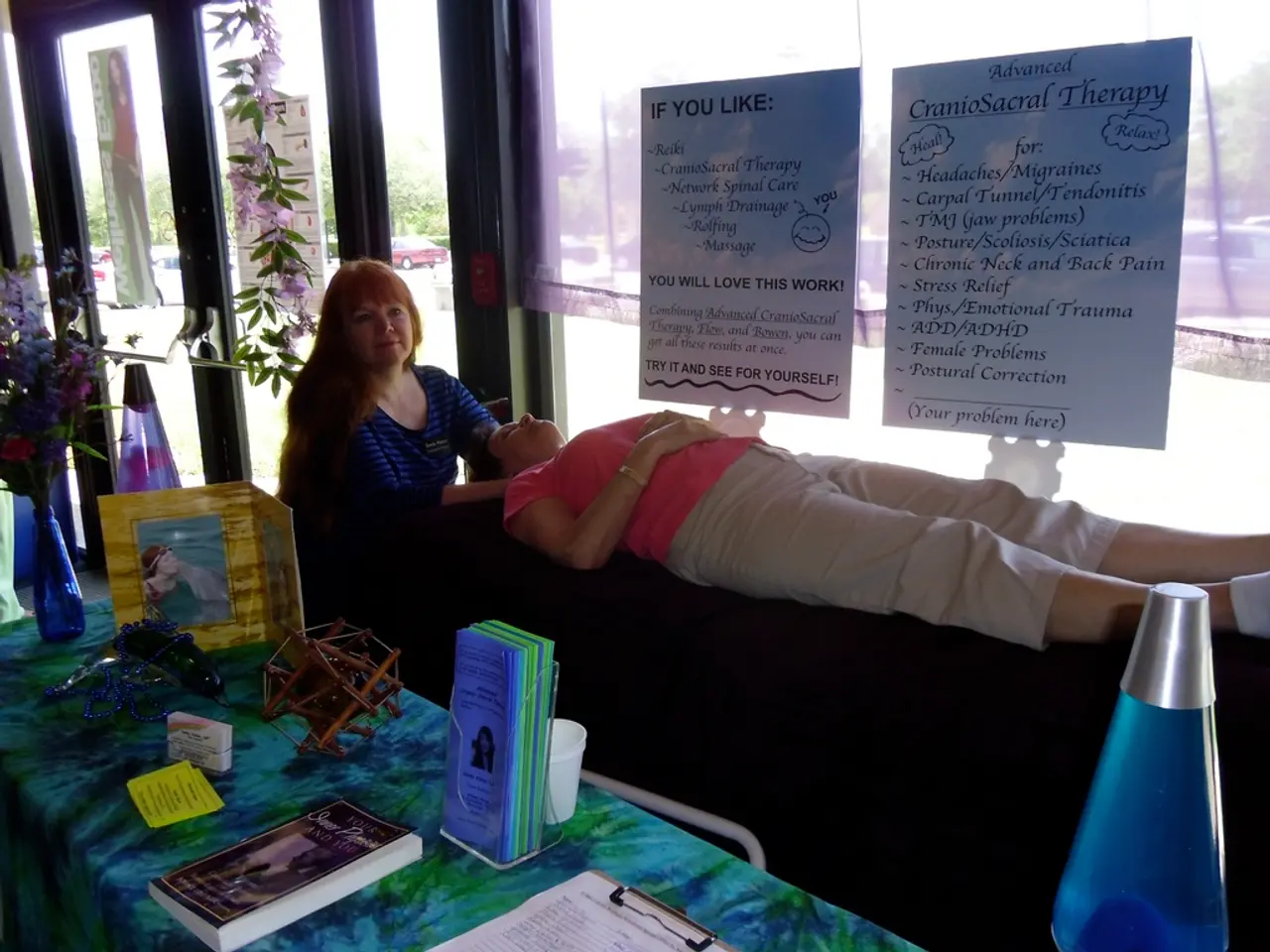Techniques for Escaping Childhood Trauma's Grip: Self-Affection Techniques
Healing from Childhood Trauma: A Comprehensive Approach
Childhood trauma can have lasting effects on an individual's emotional, physical, and mental health. However, evidence-based practices and techniques can help survivors rebuild their lives and reclaim control.
Mindfulness and Meditation
Mindfulness and meditation are powerful tools in the healing journey. They strengthen present-moment awareness and reduce anxiety linked to traumatic memories. Trauma-informed yoga, a combination of mindfulness and physical reconnection, offers a body-centered alternative to talk therapy for those with trauma-related dissociation.
Journaling
Writing about emotions and experiences helps externalize trauma, enabling understanding and restructuring of thoughts and feelings. It fosters narrative control and emotional regulation.
Self-Compassion Exercises
Self-compassion exercises, such as compassionate self-talk, gratitude affirmations, and cognitive restructuring, counteract chronic shame and the inner critic that often accompany C-PTSD and childhood trauma.
Physical Activity
Regular exercise and somatic therapies engage the body in trauma release, restore equilibrium, and improve overall mental health.
Seeking Professional Help
Trauma-focused psychotherapies like cognitive behavioral therapy (CBT), trauma-focused CBT, dialectical behavior therapy (DBT), eye movement desensitization and reprocessing (EMDR), and somatic therapy are evidence-based treatments to process and integrate traumatic experiences, reduce emotional pain, and develop healthy coping skills.
Building a Supportive Community
Establishing empathetic, non-judgmental relationships and participating in group therapy or support groups provide validation, reduce isolation, and foster resilience against trauma-related shame or self-blame.
Setting Boundaries
Learning to set and maintain healthy personal boundaries is critical for reclaiming autonomy and protecting emotional wellbeing, especially for survivors of abusive relationships or trauma bonds.
Nutrition and Sleep
Maintaining a balanced diet and getting adequate restorative sleep support brain function, emotional regulation, and overall recovery from trauma-induced physiological imbalances.
Embracing Creativity
Activities such as art, music, or other creative expressions provide nonverbal outlets for processing trauma, encourage joy, and support identity reconstruction, complementing other healing practices.
Collectively, these practices work synergistically to rebuild a sense of self, foster emotional healing, and empower trauma survivors to reclaim control over their lives.
Additional Tips
- Consistent sleep, aiming for 7-9 hours, is essential for good sleep hygiene.
- CBT (Cognitive Behavioral Therapy) is a method used to rewire negative, trauma-related thoughts.
- Chat with loved ones to deepen bonds and open up dialogues.
- Figuring out personal limits and stating boundaries clearly is essential for maintaining safety and well-being.
- Mindfulness and meditation can help reduce PTSD symptoms.
- Childhood trauma often predicts anxiety and mood issues in adulthood.
- Self-love is a crucial aspect of healing from childhood trauma.
- Journaling for emotional release aids mental health and can help clarify feelings tied to trauma.
- Attachment disorders can be a result of childhood trauma.
- Art Therapy and Music Therapy can help express and unload emotional weight.
- Joining support groups can provide comfort and camaraderie for those walking the same path.
- Self-compassion exercises, such as affirmations and mirror work, can help treat oneself like a best friend.
- A balanced diet, rich in fruits, vegetables, and whole grains, is crucial for overall health.
- Staying hydrated is important for maintaining health.
- Adults with childhood trauma often have more psychiatric issues, health problems, and substance misuse.
- Embracing a new tomorrow requires patience, commitment, and self-love, along with mindfulness, journaling, and seeking help when needed.
- Journaling about emotions and experiences externalizes trauma, enabling understanding and restructuring of thoughts and feelings, fostering narrative control and emotional regulation in healing from childhood trauma.
- Mindfulness and meditation are powerful tools in the healing journey from childhood trauma, strengthening present-moment awareness and reducing anxiety linked to traumatic memories, including trauma-informed yoga that offers a body-centered alternative to talk therapy.
- Self-compassion exercises, like compassionate self-talk, gratitude affirmations, and cognitive restructuring counteract chronic shame and the inner critic that often accompany C-PTSD and childhood trauma.
- Trauma-focused psychotherapies like CBT, trauma-focused CBT, DBT, EMDR, and somatic therapy are evidence-based treatments to process and integrate traumatic experiences, reduce emotional pain, and develop healthy coping skills during the healing process.
- Building a supportive community through empathetic, non-judgmental relationships and participating in group therapy or support groups provides validation, reduces isolation, and fosters resilience against trauma-related shame or self-blame.6.Setting boundaries is critical for reclaiming autonomy and protecting emotional wellbeing, especially for survivors of abusive relationships or trauma bonds, supplemented by regular exercise, somatic therapies, and a balanced diet for overall mental health and recovery from trauma-induced physiological imbalances.




